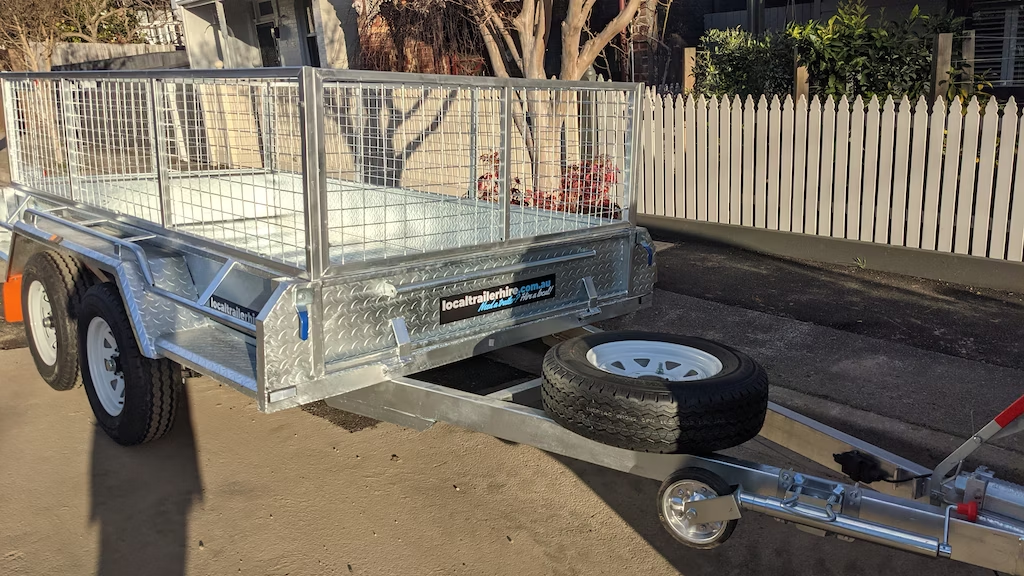
Safe hiring guide
How to safely hire a trailer through Local Trailer Hire
In this guide
We want you to have a smooth, safe and secure experience when hiring trailers through Local Trailer Hire. Check out our practical tips below to help you select the right trailer, hitch it securely, and tow it safely.
Trailer owners are happy to help if you have any safety-related questions, so if you are unsure about anything, we recommend contacting the trailer owner. You can find the Contact button on their trailer page or send them a message once you've made a booking.
Safety
The following tips for safe trailer usage are general in nature and it's essential to consult your vehicle's manual before towing. Don't hesitate to seek advice and tips from the trailer owner specific to the one you are hiring. Always prioritise safety and take necessary precautions to ensure a smooth and secure towing experience.
Choosing a trailer
- Check your vehicle's towing capacity: Ensure that your vehicle is capable of towing the weight and size of the trailer you plan to use. Refer to your vehicle's manual to determine the maximum towing capacity and ensure it exceeds the trailer's weight.
Pick-up
- Check tyre pressure: Inspect the trailer's tyres for proper inflation. Ensure they are in good condition and have adequate tread depth to provide sufficient traction and stability.
- Double-check the hitch connection: After attaching the trailer to the hitch, give it a firm tug or gentle push in different directions to confirm that it is securely fastened. The trailer should not move or sway excessively. If there is any noticeable movement or play, recheck the hitch connection, making sure it is properly latched or secured according to the manufacturer's instructions.
- Check the handbrake is disengaged: Before driving, ensure the trailer's handbrake is off and fully disengaged.
- Check the braking system is engaged: Mechanical or hydraulic brakes are activated via compression when the trailer pushes against the back of the vehicle during braking. To engage the brake system, ensure that the metal spacer is flicked "open" to allow the brake system to compress. If you need to reverse the trailer, you can flick it "closed" to disengage the braking system temporarily.
- Secure the jockey wheel: If your trailer has a jockey wheel, make sure it is properly stowed in the upright position and securely fastened. This prevents it from dragging or causing damage while towing.
- Connect safety chains: Attach safety chains from the trailer to the tow vehicle's hitch. Cross the chains under the hitch to form an X pattern, allowing them to catch the trailer in case it disconnects.
- Connect the trailer lights: Connect the trailer's electrical wiring to the tow vehicle's electrical system to ensure the trailer's indicators and brake lights function properly. Test the lights before you start towing.
- Take pre-drive photos: Before towing, snap pictures of the trailer from all sides. These photos serve as documentation of the trailer's condition when you rented it.
Loading
- Properly distribute the load: Ensure the weight inside the trailer is evenly distributed. Heavier items should be placed at the bottom and centered, with lighter items on top. Avoid overloading the trailer, as it can affect stability and braking.
- Secure the cargo: Make sure all items inside the trailer are securely tied down or strapped to prevent shifting during transit. Loose cargo can create an imbalance and affect the trailer's stability.
On the road
- Adjust your driving style: Be mindful of the additional length and weight you are towing. Allow for longer stopping distances, avoid sudden manoeuvres, and drive at a moderate speed that complies with traffic and weather conditions.
- Be cautious when changing lanes: The trailer may affect your vehicle's blind spots, so use your mirrors and check blind spots carefully before changing lanes.
- Monitor the trailer: Regularly check your mirrors to ensure the trailer is stable, cargo is secure, and there's no excessive wobbling or signs of trouble. If you notice any concerning issues, such as loose cargo, unusual smells or sounds, or potential tyre problems, it is recommended to pull over at a safe location to verify and address these concerns.

